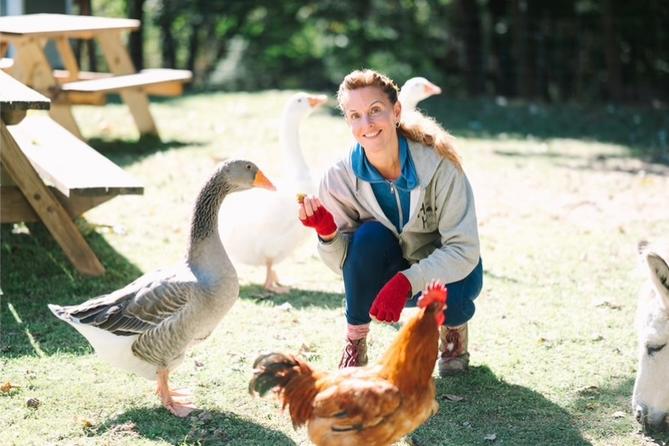PA Local Heroes is a monthly feature sponsored by Ballard Spahr. Installments appear first in PA Local, Spotlight PA’s weekly newsletter that takes a fresh, positive look at the incredible people, beautiful places, and delicious food of Pennsylvania. Sign up for free here.
The first farm animal that Karen Phillips rescued was a stray piglet named Isaac.
“Years and years ago,” she recalled, Phillips was a veterinarian working at a Pittsburgh shelter when she came across Isaac in a kennel that neighbored a rottweiler’s.
“He was obviously scared to death,” Phillips said of the pig. “So I ended up taking him home.”
The experience showed her that farm animals were just as sensitive, personable, and intelligent as pets. “He was just as smart and learned better manners than my French bulldogs had,” she said with a laugh.
Taking Isaac home also laid the groundwork for what is now a six-acre farm animal sanctuary that has become a menagerie of 127 residents, including horses, sheep, goats, pigs, emu, quail, ducks, chickens, peacocks, guinea fowl, and geese.
Phillips’ work at Hope Haven, in Pittsburgh’s North Hills, earned her a nomination for our inaugural PA Local Heroes profile, a monthly feature sponsored by Ballard Spahr. The nominator described Phillips as “more than just a caretaker; she is a champion for the voiceless, proving that a single person’s kindness can change the world, one animal at a time.”
Phillips launched Hope Haven 12 years ago. There was a learning curve, even for a trained vet.
“You pick a track in vet school, and I was small animals, like dogs and cats,” Phillips explained. “Back in the day when I went to Penn you didn’t learn much about large animals unless you were into food medicine or herd health.”
The curve didn’t involve only the obvious stuff, like figuring out diagnostics or diets. She also had to learn what counts as standard, healthy behavior for different species.
“When we first took in alpacas, they make a very forlorn and sad whining noise. It’s very weird,” Phillips said. “And I remember being beside myself and calling a lot of people kind of in a panic asking, ‘Why are they so unhappy?’ and ‘What am I doing wrong?’ Turns out it’s normal and just them talking.”
Phillips said all of the animals at the sanctuary are charismatic. She features them in tours, camps, and events to increase awareness of their sentience and put faces to factory farming.
“It’s a touchy subject,” she said. “You don’t want to get up on a soapbox and preach at people, because that’s the quickest way to turn somebody off. I try not to ever say we’re vegan, because that word sometimes makes people cringe. We love to call ourselves a ‘plant-based rescue.’”
She added, “I think the animals are their own best advocates.”
Most of us don’t think about our food or where it comes from, but that’s beginning to change, along with conceptions of the line between pets and livestock.
The pig PR machine, in particular, has been in overdrive, from George Clooney’s late potbellied pet Max to surprising IQ test results, expensive art, and think pieces on the incongruity (some say hypocrisy) of eating certain animals while treating others like family.
Phillips has plenty of favorites at the sanctuary.
There’s Rigby the emu, who’s been there for 10 years, and Boaz, a miniature donkey rescued from a kill pen five years ago.
“Maybe I'm anthropomorphizing them but … lots of animals know when we’re in good moods and bad moods,” Phillips said, “and Rigby can do something silly and bring me out of a bad mood. We just know each other so well. Rigby is definitely my BFF.”
Phillips said more and more farm animals are showing up in city shelters, which aren’t always equipped to care for them. Some come from abuse and neglect, while others are strays or unwanted pets.
Farm sanctuaries are also more commonplace now, Phillips said, and she plans to physically expand hers. Phillips does the veterinary care herself, which keeps overhead down, and said the community has been supportive of the work.
“Pittsburgh is such an amazing city and such an animal-loving community. It’s also an entrepreneur-loving community,” she said.
“I think people love the ‘Little Engine That Could’ idea. I think that appeals to people and I’m hoping that will go a long way with our expansion and our upcoming capital campaign. Fingers crossed.”
BEFORE YOU GO… If you learned something from this article, pay it forward and contribute to Spotlight PA at spotlightpa.org/donate. Spotlight PA is funded by foundations and readers like you who are committed to accountability journalism that gets results.

